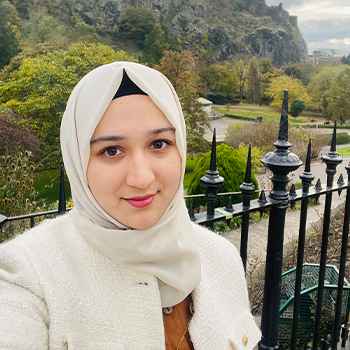As women across Afghanistan were stripped of their right to education, Tahmina Hail found herself on a new, but challenging, pathway. Here, she shares her journey from Afghanistan to the Edinburgh Medical School.
My aspiration to become a doctor originated long before my arrival in Scotland. Growing up in Afghanistan, I was deeply aware of the limited access to healthcare, which instilled in me a strong sense of responsibility to contribute to improving medical services in my country. I was honoured to be awarded the highly competitive Linda Norgrove Foundation scholarship to study medicine in Afghanistan, a process that demanded exceptional academic performance, unwavering determination, and success in multiple interviews. Maintaining this scholarship required me to sustain a university average exceeding 85%, which, while challenging, motivated me to excel.
However, just as I was embarking on the initial stages of my medical education, political developments resulted in a sudden prohibition on female students attending medical school. This abrupt policy change effectively halted my studies, denying me the opportunity to continue despite having legitimately earned my place. This moment represented one of the most difficult challenges in my academic journey.
In response to this crisis, the Linda Norgrove Foundation organisation created a new pathway for a limited number of Afghan female medical students to continue their education in Scotland. The selection process was highly competitive, requiring sustained academic excellence at both school and university levels, as well as success in interviews and the IELTS examination. I was honoured to be among those selected, though I remain mindful of the many talented and deserving students who were not chosen due to the limited number of scholarships available.
Arriving in Scotland marked the beginning of a significant new chapter in both my academic and personal life. I began my studies with the Gateway to Medicine programme at the University of Glasgow, which I had to successfully complete by achieving a required grade in order to be accepted into medical school. However, the transition proved to be both emotionally and academically challenging. The differences in the education system, the unfamiliar language, and the need to adapt to an entirely new cultural environment required considerable resilience.
Throughout this period, I experienced fluctuating emotions. There were times when I felt a sense of belonging and confidence in my ability to succeed. Conversely, I also faced moments of profound uncertainty, during which I felt isolated and doubted whether I could truly fit in or meet the expectations placed upon me. These feelings of inadequacy and self-doubt were difficult but genuine experiences. Crucially, the support I received from compassionate mentors, encouraging peers, and accessible academic guidance played a pivotal role in helping me navigate these challenges. I gradually learned the importance of seeking help, trusting the learning process, and persevering despite feelings of uncertainty.
Currently, I am undertaking my first year at the University of Edinburgh Medical School. I am fully aware that the path ahead will be demanding and complex. Nevertheless, I approach this journey with increased resilience and clarity of purpose. Through my experiences, I have come to understand that academic success is not defined by perfection, but rather by persistence, self-awareness, and the willingness to accept support when needed. Most importantly, I have learned that feeling lost or uncertain at times is a natural part of the process, provided one continues to move forward.
To others facing obstacles, I would say: your journey may not go as planned, but that does not mean your dream is over. To my younger self, I would affirm: “You didn’t fail—you just had to find another way forward.”




Thanks a lot for sharing with us your journey Journey from Afghanistan to Scotland. This is really inspiring and shows your remarkable resilience and purpose. I especially value your message to others facing obstacles: “your journey may not go as planned, but that does not mean your dream is over” . I trust Scotland and the UoE MBChB program will provide you with the right environment, education and support to keep moving forward towards your dream, and i am confident that with your mindset, you will on the way you will contribute meaningfully to your cohort and community. Best wishes with the months and years to come